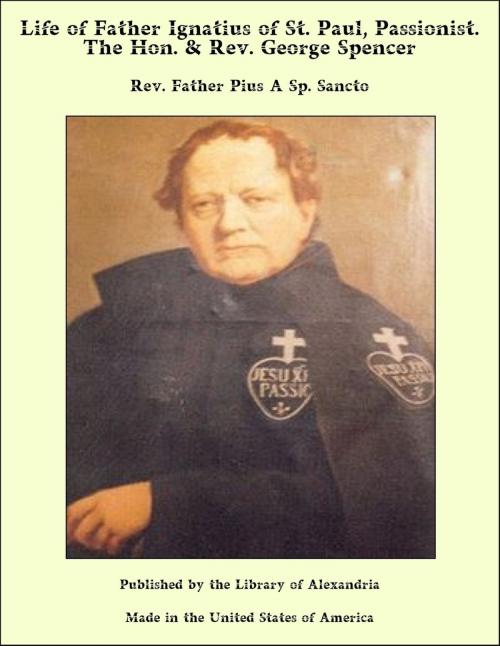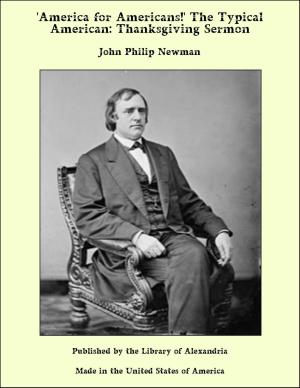Life of Father Ignatius of St. Paul, Passionist. The Hon. & Rev. George Spencer
Nonfiction, Religion & Spirituality, New Age, History, Fiction & Literature| Author: | Rev. Father Pius A Sp. Sancto | ISBN: | 9781465607416 |
| Publisher: | Library of Alexandria | Publication: | March 8, 2015 |
| Imprint: | Language: | English |
| Author: | Rev. Father Pius A Sp. Sancto |
| ISBN: | 9781465607416 |
| Publisher: | Library of Alexandria |
| Publication: | March 8, 2015 |
| Imprint: | |
| Language: | English |
Great servants of God have seldom been understood in their lifetime. Persecution has assailed them often, from quarters where help would be expected in their defence. Even holy souls are sometimes mistaken about the particular line of virtue which distinguishes their contemporaries from themselves. St. John of the Cross, St. Joseph Calasanctius, and St. Alphonsus Liguori, have had the close of their lives embittered, as we might call it, by domestic persecution; and it was some time before their splendour, as they vanished from the horizon of life, rose again to its zenith, and outshone its former glory. If the impartial eye, with which we read their actions, fails to find a plea for the manner they have been dealt with, let us remember that we have no interests at stake—no false colouring of passion to blind us. Death, indeed, does not always mow down mistaken notions with the life of him about whom they are taken up. We must, however, be thankful that it slays so many wrong impressions, and attribute the residue to other causes. Justice to the dead is an impulse of nature; and those who would qualify praise of the living by the mention of unworthy actions or inferior motives, will qualify blame of the dead by a contrary proceeding. This instinct has its golden mean as well as every other. If an ancient Greek ostracised a man because he was praised by every one, many moderns will defend a man because he is similarly blamed. Whenever there exists a difference of opinion about a man during life, it requires some length of time after he has departed, for prejudice to settle to the bottom, and allow his genuine character to be seen through clearly. These facts, and the experience of history, lead us to conclude that a man's life cannot be impartially written when his memory is yet fresh in people's minds. Thousands have had opportunities of judging, and bring their impressions to compare them with the page that records the actions from which they were taken; and if they be different from the idea the biographer intends to convey, it is not probable that, in every case, their possessors will be content to lay them aside. It is supposed, moreover, that a biographer owes a kind of vassalage to his subject— that he is obliged to defend him through thick and thin—in good and evil report. He is obliged, according to traditionary, though arbitrary laws, to suppress whatever will not tell in his favour, to put the very best face upon what he is compelled to relate, and to make the most of excellencies. His opinion, therefore, must be received with caution, for it is his duty to be partial, in the most odious sense of that word, and it would be a capital sin to deviate from this long-established rule. These difficulties do not beset the life that is here presented to the public. Father Ignatius had his alternations of praise and blame during life; but those who thought least of him were forced to admit his great sanctity. If this latter quality be conceded, apology has no room. An admitted saint does not require to be defended; for the aureola of his own brow will shed the light through which his actions are to be viewed. We see, therefore, no wrong impressions that require to be removed—no calumnies that have to be cleared away—nothing, in fact, to be done, except to give a faithful history of his life. For this reason, we venture to publish this work before the second anniversary of his death; and it would have been published sooner, if the materials from which it is composed could have been arranged and digested.
Great servants of God have seldom been understood in their lifetime. Persecution has assailed them often, from quarters where help would be expected in their defence. Even holy souls are sometimes mistaken about the particular line of virtue which distinguishes their contemporaries from themselves. St. John of the Cross, St. Joseph Calasanctius, and St. Alphonsus Liguori, have had the close of their lives embittered, as we might call it, by domestic persecution; and it was some time before their splendour, as they vanished from the horizon of life, rose again to its zenith, and outshone its former glory. If the impartial eye, with which we read their actions, fails to find a plea for the manner they have been dealt with, let us remember that we have no interests at stake—no false colouring of passion to blind us. Death, indeed, does not always mow down mistaken notions with the life of him about whom they are taken up. We must, however, be thankful that it slays so many wrong impressions, and attribute the residue to other causes. Justice to the dead is an impulse of nature; and those who would qualify praise of the living by the mention of unworthy actions or inferior motives, will qualify blame of the dead by a contrary proceeding. This instinct has its golden mean as well as every other. If an ancient Greek ostracised a man because he was praised by every one, many moderns will defend a man because he is similarly blamed. Whenever there exists a difference of opinion about a man during life, it requires some length of time after he has departed, for prejudice to settle to the bottom, and allow his genuine character to be seen through clearly. These facts, and the experience of history, lead us to conclude that a man's life cannot be impartially written when his memory is yet fresh in people's minds. Thousands have had opportunities of judging, and bring their impressions to compare them with the page that records the actions from which they were taken; and if they be different from the idea the biographer intends to convey, it is not probable that, in every case, their possessors will be content to lay them aside. It is supposed, moreover, that a biographer owes a kind of vassalage to his subject— that he is obliged to defend him through thick and thin—in good and evil report. He is obliged, according to traditionary, though arbitrary laws, to suppress whatever will not tell in his favour, to put the very best face upon what he is compelled to relate, and to make the most of excellencies. His opinion, therefore, must be received with caution, for it is his duty to be partial, in the most odious sense of that word, and it would be a capital sin to deviate from this long-established rule. These difficulties do not beset the life that is here presented to the public. Father Ignatius had his alternations of praise and blame during life; but those who thought least of him were forced to admit his great sanctity. If this latter quality be conceded, apology has no room. An admitted saint does not require to be defended; for the aureola of his own brow will shed the light through which his actions are to be viewed. We see, therefore, no wrong impressions that require to be removed—no calumnies that have to be cleared away—nothing, in fact, to be done, except to give a faithful history of his life. For this reason, we venture to publish this work before the second anniversary of his death; and it would have been published sooner, if the materials from which it is composed could have been arranged and digested.















